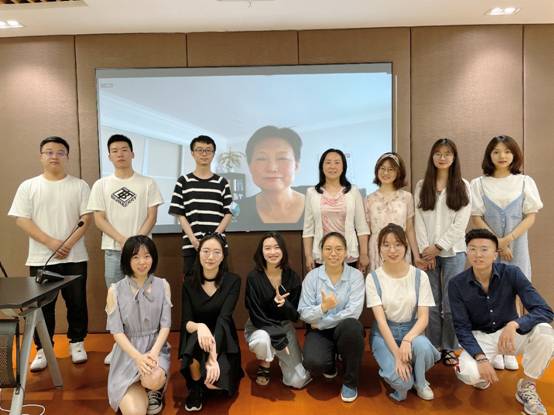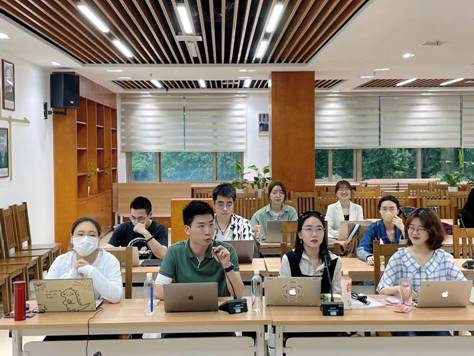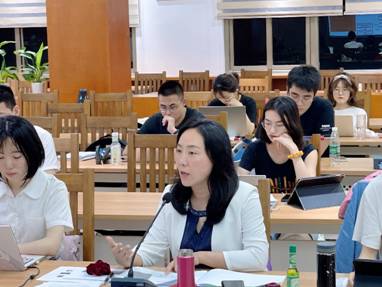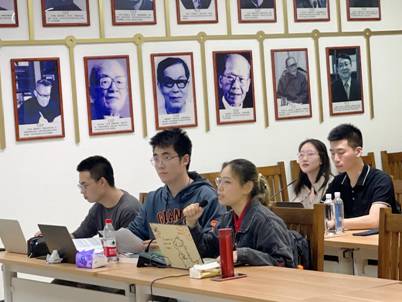In recent years, in accordance with Xi Jinping's instruction of "promoting domestic rule of law and foreign-related rule of law in an integrated manner", Wuhan University Law School has further expanded and strengthened the training of foreign-related talents, and vigorously promoted the development and construction of international high-quality courses. In the area of international taxation and foreign-related talents cultivation, the School offered the course "International Tax Law: Theories, Principles, Rules and Tax Planning" in English, from May 24 to June 4. Professor Li Jinyan, a famous expert in international tax law, was invited to give a lecture, and Professor Cui Xiaojing, Deputy Director of Wuhan University Institute of International Law and Director of International Tax Law Research Center, participated in the course and discussed with the students online and offline.

In order to help students develop an international perspective and global awareness, the course specially invited Professor Li Jinyan from York University Law School to be the lecturer. Professor Li has been deeply involved in the study of international tax law for many years and is well versed in Chinese and Canadian tax law. She is currently an expert advisor of the "One Belt, One Road" tax collection and management cooperation mechanism and has extensive academic influence in the field of international tax law.

The course adopts a closed-loop teaching model of "course organization, pre-course pre-reading, classroom interaction, post-course evaluation, and course improvement" to achieve the best teaching effect. In terms of course design, the teaching team announces the course outline and course materials to students before the course starts, and makes adjustments to the course content based on students' feedback from pre-study. In terms of teaching content, the course explores China's foreign-related tax law and tax treaty system from the perspective of comparative law, combines a large number of typical cases, and integrates the basic theory with the frontier hotspots. In terms of teaching methods, the course adopts an interactive and inspiring teaching mode to create a "classroom without correct answers" and guide all students to actively participate in classroom seminars.

The promotion of full English and bilingual teaching still faces the point that students are afraid to choose the courses and do not understand the courses. On the one hand, students tend to take refuge in the mentality of choosing easy courses, and are often afraid to choose courses that are difficult to follow. On the other hand, the full English language course places high demands on students' professional and foreign language skills. In response, the teaching team actively changed teaching models.

First, the course is conducted with Professor Li Jinyan teaching online and students listening offline, while Professor Cui Xiaojing, as the Chinese teacher, participates in the whole teaching process, summarizing the key problems encountered in the course to students in Chinese, helping students to understand.
Secondly, the course arranged Chen Jingxian, a PhD student in international tax law, as a teaching assistant to arrange the readings before the class, use half an hour before each class to lay out the necessary basic knowledge in Chinese, and collect students' difficult questions after the class.

Finally, this course tries to introduce the "graduate student + undergraduate student" group cooperation model, in which graduate students in international tax law work one-on-one with undergraduate students who take the course, prepare the pre-test content together, participate in class discussions, and guide the writing of the final paper after the class. This mode of cooperation will help the undergraduates to grow up.
After the course, the teaching team distributed questionnaires to all students who took the course and summarized the feedback. The results of it showed that the students generally thought that this challenging course had greatly improved their English and professional skills. In the feedback after the course, Li Xinying from the School of Law said, "In this international tax law journey, Mrs. Li's answered all our questions carefully; Mrs. Cui's relieved the remaining confusion in time; the tutor's guidance provided the knowledge reserve for the smooth progress of the class."
At the same time, the lecture was promoted through the online platform, with a cumulative reading of nearly 3,000 times, and a course sharing mechanism was established to open the lecture platform to Fudan University, China University of Political Science and Law and other institutions. Based on the success of this full English course on international tax law, the law school will continue to introduce various high-quality teaching resources.
Edited by Wang Yuting & Wu Liuqing

